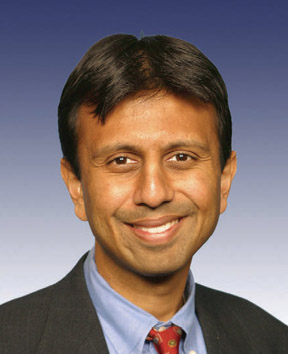Bobby Jindal set to enjoy his big GOP moment in US Congress
 Louisiana (US), Feb. 23 : When Louisiana's Indian American Governor Bobby Jindal delivers the Republican response to President Barack Obama's Message to Congress on Tuesday, most Americans will be seeing him for the first time.
Louisiana (US), Feb. 23 : When Louisiana's Indian American Governor Bobby Jindal delivers the Republican response to President Barack Obama's Message to Congress on Tuesday, most Americans will be seeing him for the first time.
It's a prime opportunity for the 37-year-old state executive to introduce himself to the public and define himself as a leader of his party-and a potential contender for national office.
"He's somebody I think we're all looking to, to demonstrate that Republicans do have a positive solution to the challenges facing this country," Politico quoted House Minority Whip Eric Cantor, as saying.
"Bobby's certainly one of those people," he added.
In the past few weeks, Jindal has emerged as one of the GOP's high-profile critics of the stimulus plan Obama recently signed into law.
On Friday, he helped solidify his status as a conservative leader by becoming the first governor to refuse some funding from the stimulus package. His office released a statement announcing Louisiana will reject stimulus money targeted at expanding state unemployment insurance coverage.
"The federal money in this bill will run out in less than three years for this benefit and our businesses would then be stuck paying the bill," Jindal said in the statement. "We cannot grow government in an unsustainable way."
Jindal is a cultural as well as a fiscal conservative, and his traditional Catholic views-including an article he wrote in 1994 about an exorcism he witnessed-have drawn fire from some Democrats. But he also has a personal narrative that's drawn comparisons to that of Barack Hussein Obama.
Piyush "Bobby" Jindal (he's called himself and been known as Bobby since he was a young boy), the son of Punjabi Indian immigrants, converted from Hinduism to Catholicism before graduating from Brown with degrees in biology and public policy and then earning a master's in political science from Oxford, where he was a Rhodes scholar.
In 1996, he became Louisiana's Health Secretary, responsible at age 25 for 40 percent of the state's budget, and in 2001 he went to Washington to serve as an Assistant Secretary at the Department of Health and Human Services. He mounted his first gubernatorial campaign in 2003, losing by just four points but firmly establishing his name in the state.
Elected governor on his second try in 2007 after a short stint in Congress, Jindal seemed to represent an ideal opportunity for Republican renewal in a state devastated-and politically upended-by Hurricane Katrina.
Perhaps most importantly for his future national prospects, he hails from outside of Washington-a strong asset to a party that has been suffered from its close identification with Beltway politics.
For Republicans struggling to define a positive message and escape the label of obstructionism, tapping a state executive for the response gives the GOP a chance to look like more than an opposition party. Giving the Republican response to Obama is not a risk-free proposition for Jindal, who has never matched rhetorical skills with an orator as skilled or popular as Obama. He's never had to compete on such an uneven playing field as he'll have Tuesday night, when the President will benefit from all the trappings of his office, speaking to a Democratic-majority Congress in the aftermath of a major legislative victory.
Still, if Jindal is taking a risk on his career, it may be a risk worth taking. Other governors, such as Barbour, Alaska's Sarah Palin, South Carolina's Mark Sanford, Utah's John Huntsman and Florida's Charlie Crist are angling for leadership roles in the party-and as maneuvering for 2012 quietly starts, no one will have the kind of platform Jindal is getting Tuesday night. (ANI)